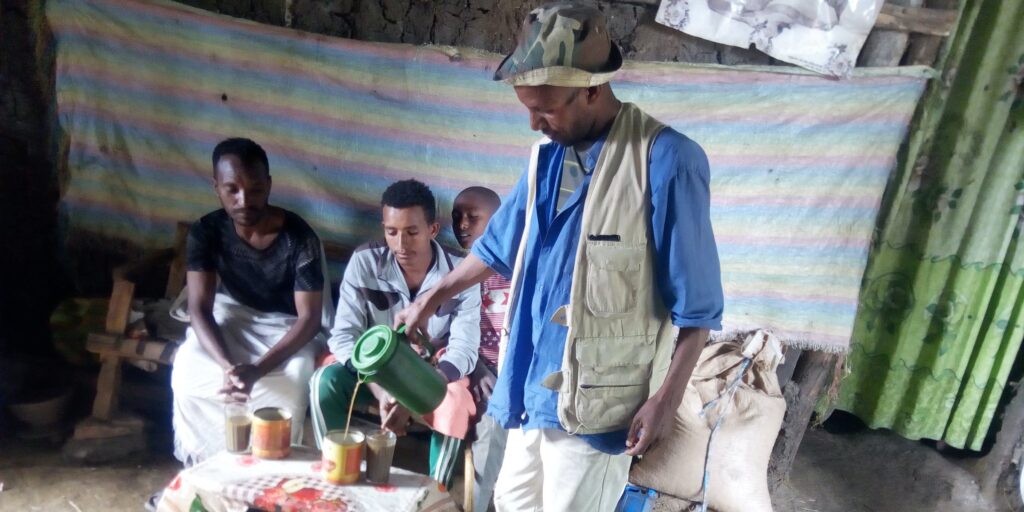For years, Yalew and Yebirguwal struggled to provide nutritious food for their two children. Like many Ethiopian families, they had no land of their own but were instead forced to rent small farm plots or offer themselves as hired labor.
But this didn’t work for Yalew, who was physically unable to pursue most of the income-generating activities available to him in his Ethiopian community.
As the family’s hunger crisis grew, Yalew decided to move them to a nearby town, hoping that prospects for trade and daily labor would be brighter there. But no matter how hard they tried, he never seemed able to find adequate work to support their family.
Held Back By Stereotypes
Smart and strong, Yebirguwal was physically capable of providing an income for her family. But negative norms and stereotypes around women in the community prohibited her from seeking the types of work that could have improved the family’s situation.
Plentiful day labor jobs were available, like plowing, planting, weeding, harvesting, and threshing. But they were all considered off-limits for women, reserved for men only. And Yalew definitely didn’t want his wife working outside the home.
Similarly, beliefs about the roles of men and women complicated life at home. While Yalew was physically unable to work outdoor jobs to generate income, he was very capable of helping with the children and many other tasks at home to free Yebirguwal for other work.
But it was believed that household chores belonged to the woman. So Yalew was unwilling to help around the house, since he believed that was shameful for a man.
All Responsibilities, No Voice
Yebirguwal was stretched thin. She was responsible for everything but didn’t have the support to succeed at much of anything.
“I had no voice when it came to decisions about our resources. I wasn’t allowed to participate in public events,” Yebirguwal explains. “I was even unable to attend religious activities without the permission of my husband.”
Yalew nods, remembering the inequality that existed in their marriage. “It’s true, we faced a serious shortage of income, but I was not good at managing our budget and expenses. And there was no working together to maximize our resources or find ways to cover costs.”

A Marriage Restored
For Yalew and Yebirguwal, everything changed when Food for the Hungry (FH) entered their community. They were invited to take part in a Gender Outreach Group with 20 other couples in their village. A generous grant from the U.S. Agency for International Development (USAID) made the program possible.
Through this Gender Outreach Group model, couples increase their awareness and acceptance of healthier gender norms. They learn to practice equitable decision making through guided discussion and dialogue. The groups are just one of the ways FH is able to strengthen communities in vulnerable places around the world.
At each meeting, Yalew, Yebirguwal, and the other couples identified negative gender norms and gaps in their community. They then discussed alternative approaches and ways of thinking that could help them fill those gaps and improve their family situations.
The discussions with others in their community made an amazing difference. Yebirguwal and Yalew now make their household plans together. They divide their labor roles more equitably both inside and outside the home, based on their strengths and abilities.
Decisions about the family’s resources are made by discussion and consensus, so that Yebirguwal now has a voice in her own future. Working together as a team, Yalew and Yebirguwal have accelerated their journey out of poverty by leaps and bounds.

New Roles Without Restraints
Yebirguwal is the family planner. She learned ways to develop livelihoods and diversify their methods of earning income. She buys sheep to fatten and sells them for a profit. She rents farmland where she plows and sows seed.
Yalew cooks for the family and discovered he has many talents. He developed a business selling a tea he developed, called “tela,” which he brews at home for distribution.
The couple and their children no longer go hungry or struggle with health problems. They were able to build a very large house in town, where they lead a resilient and sustainable life.
As opposed to hurting their marriage, Yalew and Yebirguwal are much happier together today. They have become role models and were selected as a “gender champion family.” In that capacity, they frequently host neighbors in their home to share the lessons they’ve learned.
The Gender Outreach Group is part of a successful program that illustrates how matching grant projects can make a significant difference for a whole community.
The funds that made this program available for these families came through a grant from USAID. When you give to FH through multiply your donation, your generous contributions are multiplied an average of 22x by USAID and our other partner agencies. In this way, you can have a far greater impact to strengthen communities throughout the world.
Continue Reading:


